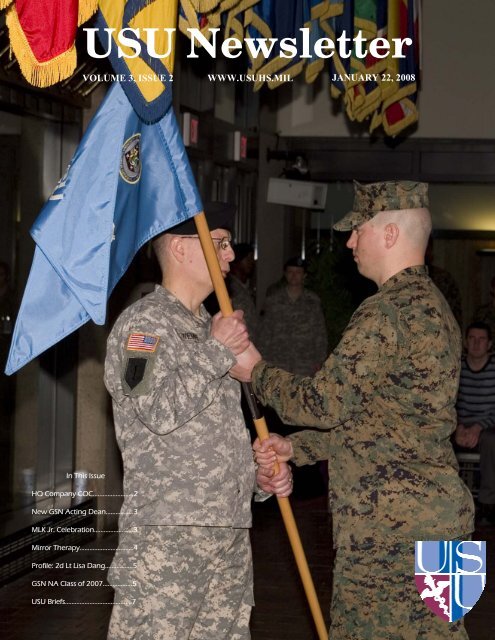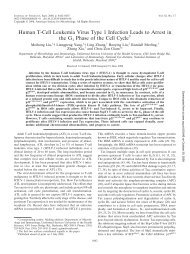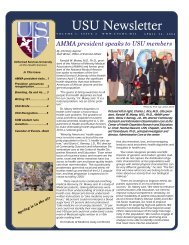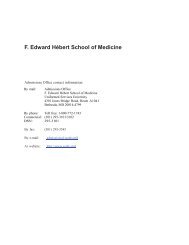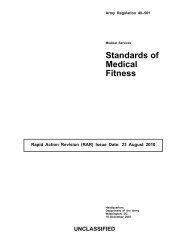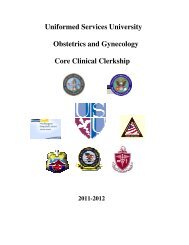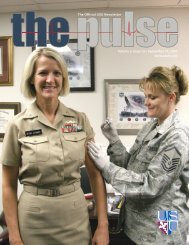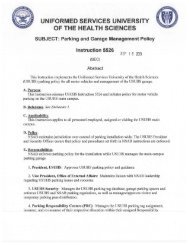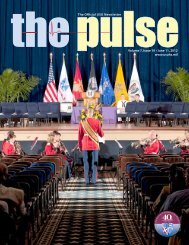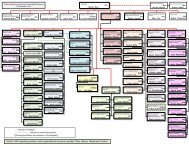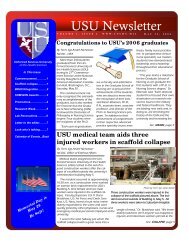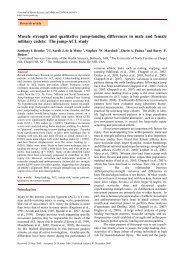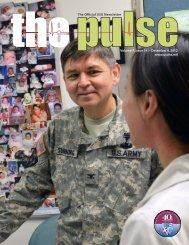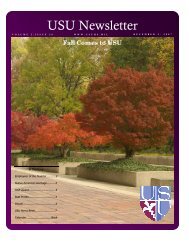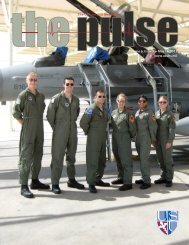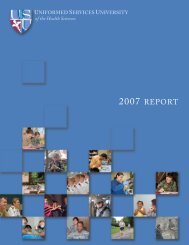USU Newsletter - Uniformed Services University of the Health ...
USU Newsletter - Uniformed Services University of the Health ...
USU Newsletter - Uniformed Services University of the Health ...
Create successful ePaper yourself
Turn your PDF publications into a flip-book with our unique Google optimized e-Paper software.
<strong>USU</strong> <strong>Newsletter</strong><br />
VOLUME 3, ISSUE 2 WWW.<strong>USU</strong>HS.MIL JANUARY 22, 2008<br />
In This Issue<br />
HQ Company COC..…………………..2<br />
New GSN Acting Dean.………..…..3<br />
MLK Jr. Celebration.…………………..3<br />
Mirror Therapy…………………………...4<br />
Pr<strong>of</strong>ile: 2d Lt Lisa Dang……………..5<br />
GSN NA Class <strong>of</strong> 2007……………...5<br />
<strong>USU</strong> Briefs…………………………………..7
<strong>USU</strong> <strong>Newsletter</strong><br />
Editorial Staff<br />
Carol R. Scheman<br />
Vice President for<br />
External Affairs and<br />
Managing Editor<br />
Tech. Sgt.<br />
André Nicholson<br />
Editor<br />
Mass Communications<br />
Specialist Third Class<br />
Jeffrey Hopkins<br />
Assistant Editor<br />
Mass Communications<br />
Specialist<br />
Seaman<br />
Raul Zamora<br />
Assistant Editor<br />
Marla Wright<br />
Webmaster<br />
Publishing<br />
<strong>USU</strong> Duplicating Office<br />
<strong>USU</strong> Bids Farewell to its Lone Marine,<br />
Welcomes new Senior Enlisted Leader<br />
By MCSN Raul Zamora<br />
Assistant Editor, Office <strong>of</strong> External Affairs<br />
The hails and farewells <strong>of</strong> any military command<br />
are bittersweet; with <strong>the</strong> sorrowful departure <strong>of</strong> a<br />
friend comes <strong>the</strong> excitement <strong>of</strong> an incoming one.<br />
The <strong>Uniformed</strong> <strong>Services</strong> <strong>University</strong> <strong>of</strong> <strong>the</strong> <strong>Health</strong><br />
Sciences (<strong>USU</strong>) recently bid farewell to its Headquarters<br />
Company commander in a ceremony Jan.<br />
11.<br />
With <strong>the</strong> departure <strong>of</strong> Capt Timothy Gerlach,<br />
USMC, <strong>the</strong> responsibility for Headquarters Company<br />
personnel has been transferred to COL John<br />
Wempe, MC, USA, <strong>USU</strong> Brigade Commander, until<br />
a suitable replacement for Gerlach can be found.<br />
Dr. Charles Rice, university president, thanked<br />
Gerlach for his years <strong>of</strong> service to both <strong>the</strong> <strong>USU</strong><br />
Headquarters Company and <strong>the</strong> U.S. Marine Corps.<br />
He remarked upon Gerlach’s strong sense <strong>of</strong> pride,<br />
and commended him for his participation in seven<br />
operations Bushmaster, sharing his immense experience<br />
with more than 800 medical students.<br />
Gerlach said his time as company commander<br />
gave him a strong idea <strong>of</strong> <strong>the</strong> work ethic and intelligence<br />
<strong>of</strong> <strong>the</strong> U.S. military’s enlisted corps, and that<br />
it was an experience he won’t soon forget.<br />
“It was fun working for <strong>the</strong> brigade, and now I<br />
feel more <strong>of</strong> an appreciation towards <strong>the</strong> enlisted<br />
service members,” he said. “I learned a lot about<br />
<strong>the</strong>ir culture. It was my great pleasure to work with<br />
<strong>the</strong>m, and it will be something that I will treasure<br />
for a long time.”<br />
Gerlach was<br />
<strong>the</strong>n awarded <strong>the</strong><br />
Defense Meritorious<br />
Service Medal<br />
for his invaluable<br />
service to <strong>the</strong> <strong>USU</strong><br />
Brigade.<br />
In conjunction<br />
with <strong>the</strong> change <strong>of</strong><br />
command ceremony,<br />
a change <strong>of</strong><br />
responsibility also<br />
took place, as SFC<br />
Donald Peña,<br />
USA, passed <strong>the</strong><br />
position <strong>of</strong> brigade<br />
Senior<br />
Enlisted Leader on<br />
to HMCM Clinton<br />
A. Garrett, USN.<br />
Photo by HM2 Michael Oliver<br />
COL John Wempe, MC, USA,<br />
congratulates Capt. Tim Gerlach,<br />
USMC, on his Defense<br />
Meritorious Service Medal.<br />
Garrett has served more than 24 years in <strong>the</strong><br />
U.S. Navy in various roles, including director for <strong>the</strong><br />
<strong>Health</strong> Resources Management Course at <strong>the</strong> Naval<br />
School <strong>of</strong> <strong>Health</strong> Sciences in Be<strong>the</strong>sda, Md., and<br />
Navy senior enlisted leader at Headquarters, U.S.<br />
Marine Corps in Washington, DC.<br />
During <strong>the</strong> ceremony Garrett remarked that he<br />
was eager to assume responsibility <strong>of</strong> <strong>the</strong> position,<br />
and thanked Peña for his service to <strong>the</strong> brigade.<br />
See COMMAND, page 6<br />
Production:<br />
Editorial content is<br />
edited, prepared and<br />
provided by <strong>the</strong> <strong>USU</strong><br />
Office <strong>of</strong> External Affairs<br />
unless o<strong>the</strong>rwise<br />
indicated. The <strong>Newsletter</strong><br />
staff may include<br />
or exclude articles<br />
based upon news<br />
value, impact on <strong>the</strong><br />
university and space<br />
availability.<br />
Submissions:<br />
The <strong>USU</strong> <strong>Newsletter</strong><br />
will be published biweekly<br />
on Mondays<br />
and deadline for submission<br />
is Friday at 4<br />
p.m. Submissions can<br />
be sent to usunewsletter@usuhs.mil<br />
or call<br />
301-295-3925.<br />
Cover Photo by<br />
HM2 Michael Oliver<br />
Photo by HM2 Michael Oliver<br />
From left to right: SFC Donald Peña, USA, outgoing Senior Enlisted Leader; HMCM Clinton A. Garrett,<br />
USN, incoming SEL; COL John Wempe, MC, USA, <strong>USU</strong> Brigade Commander; Capt Timothy Gerlach,<br />
USMC, outgoing Headquarters Company Commander; and Dr. Charles L. Rice, <strong>University</strong> President,<br />
stand at attention while <strong>the</strong> citation for Capt Gerlach is read.<br />
PAGE 2
Graduate School <strong>of</strong> Nursing Receives New Acting Dean<br />
By MCSN Raul Zamora<br />
Assistant Editor, Office <strong>of</strong> External Affairs<br />
With <strong>the</strong> departure <strong>of</strong> <strong>the</strong> <strong>Uniformed</strong> <strong>Services</strong> <strong>University</strong> <strong>of</strong> <strong>the</strong><br />
<strong>Health</strong> Sciences’ (<strong>USU</strong>) acting dean <strong>of</strong> <strong>the</strong> Graduate School <strong>of</strong><br />
Nursing (GSN,) a familiar face has stepped up to <strong>the</strong> challenge<br />
and responsibility <strong>of</strong> <strong>the</strong> education <strong>of</strong> <strong>the</strong> military’s top nurses in<br />
that position.<br />
COL Bruce A. Schoneboom, CRNA, Ph.D., AN, USA, has served<br />
<strong>the</strong> university in a variety <strong>of</strong> roles, including research director for<br />
<strong>the</strong> Nurse Anes<strong>the</strong>sia Program, department chair for <strong>the</strong> GSN, and<br />
vice dean <strong>of</strong> <strong>the</strong> GSN. With retired BG William Bester’s resignation<br />
from acting dean in December, Schoneboom has agreed to take<br />
on <strong>the</strong> role <strong>of</strong> acting dean until a replacement is found.<br />
An alumnus <strong>of</strong> <strong>the</strong> university’s neuroscience and graduate education<br />
programs, Schoneboom said he’s eager to take on this<br />
leadership role.<br />
“It’s exciting and challenging to be <strong>the</strong> acting dean <strong>of</strong> <strong>the</strong><br />
GSN,” he said. “It’s certainly an honor to be in a position to lead in<br />
a school like this.”<br />
Schoneboom said interesting and effective changes are on <strong>the</strong><br />
way for <strong>the</strong> GSN, to include new programs.<br />
“To be an effective organization change has to occur, and<br />
<strong>the</strong>re are certainly things that will continue to change within <strong>the</strong><br />
GSN,” he said. “The new Psychiatric Mental <strong>Health</strong> Nurse Practitioner<br />
Program will matriculate students this summer.”<br />
Schoneboom’s new responsibilities will include active participation<br />
as a part <strong>of</strong> <strong>the</strong> university president’s cabinet, and to work<br />
with <strong>the</strong> Federal Nursing Service Chiefs to ensure <strong>the</strong> quality and<br />
scope <strong>of</strong> <strong>the</strong> new GSN programs will meet <strong>the</strong> standards <strong>of</strong> <strong>the</strong><br />
services. He said <strong>the</strong> responsibility and challenges <strong>of</strong> <strong>the</strong> position<br />
are much larger than those he’s faced in former positions, but that<br />
he’s ready and eager to take on both.<br />
<strong>USU</strong> Celebrates Martin Lu<strong>the</strong>r King, Jr. Day<br />
By MC3 Jeff Hopkins<br />
Assistant Editor, Office <strong>of</strong> External Affairs<br />
“It’s certainly a larger administrative<br />
role than what<br />
I’ve been in before,” he said. “I<br />
already had an idea what to<br />
expect, but you never know<br />
what it’s like until you’re actually<br />
experiencing it. General<br />
Bester and I worked hard in<br />
making sure <strong>the</strong> transition<br />
would go smoothly when he<br />
departed. When a permanent<br />
dean is found, I will go back<br />
to my previous assignment as<br />
<strong>the</strong> vice dean.”<br />
Schoneboom said he’s continually<br />
impressed with <strong>the</strong><br />
ways in which <strong>the</strong> university<br />
continues to progress and<br />
change for <strong>the</strong> better, from<br />
<strong>the</strong> campus structure, to <strong>the</strong><br />
programs through which <strong>the</strong><br />
students are educated.<br />
The <strong>Uniformed</strong> <strong>Services</strong> <strong>University</strong> <strong>of</strong> <strong>the</strong><br />
<strong>Health</strong> Sciences (<strong>USU</strong>) celebrated Martin<br />
Lu<strong>the</strong>r King, Jr. day during a ceremony Jan.<br />
14.<br />
The keynote speaker, Dr. Clifford L.<br />
Stanley, a retired Marine Corps major general,<br />
gave a speech entitled “Remember!<br />
Celebrate! Act! A day on… Not a day <strong>of</strong>f,”<br />
Stanley spoke <strong>of</strong> his experiences during<br />
<strong>the</strong> times when America was slowly abolishing<br />
segregation.<br />
“It was a different time,” he said. “I remember<br />
almost as if it were yesterday<br />
when Glen Echo Park was integrated;<br />
when that happened, it didn’t stay open<br />
long. They closed it because <strong>the</strong>y didn’t<br />
want people like me <strong>the</strong>re.”<br />
“It didn’t traumatize me; it was just <strong>the</strong><br />
way it was,” he said.<br />
Stanley’s parents sent him and his siblings<br />
to South Carolina each summer to<br />
work on a farm, cropping tobacco for minimum<br />
wages. He said it taught him a lot<br />
about segregation, and he and his siblings<br />
had to go to Atlantic Beach ra<strong>the</strong>r than<br />
Myrtle Beach, due to racial restraints.<br />
“At that time I remember we didn’t<br />
care,” he said. “We had more fun than at<br />
“I had a family that believed firmly<br />
that no one was any better than<br />
anyone else,” Stanley said. “If you<br />
acted to <strong>the</strong> contrary, <strong>the</strong>y would<br />
remind you very quickly.”<br />
Dr. Clifford L. Stanley<br />
Myrtle, it was a better beach.”<br />
Stanley said his family believed firmly in<br />
Martin Lu<strong>the</strong>r King, Jr.’s tenants, in particular,<br />
that individual worth is not determined<br />
by a person’s social status, race, or achievements;<br />
that no person is better than ano<strong>the</strong>r.<br />
“I had a family that believed firmly that<br />
no one was any better than anyone else,”<br />
Stanley said. “If you acted to <strong>the</strong> contrary,<br />
“The two words that come to mind when I think <strong>of</strong> <strong>the</strong> progress<br />
<strong>USU</strong> has made from when I was a graduate student until<br />
now are ‘bigger and better,’” he said. “This place is very special;<br />
both <strong>the</strong> School <strong>of</strong> Medicine and <strong>the</strong> GSN have grown in terms <strong>of</strong><br />
size and <strong>the</strong> programs <strong>the</strong>y <strong>of</strong>fer. The research conducted here is<br />
very exciting, in terms <strong>of</strong> improving <strong>the</strong> health <strong>of</strong> <strong>the</strong> nation, and<br />
particularly <strong>the</strong> uniformed services. The educational programs are<br />
top notch, many with high national rankings. It’s an honor to be<br />
serving this university, and hopefully I’ll be around for a few more<br />
years, continuing to serve and lead.”<br />
<strong>the</strong>y would remind<br />
you very<br />
quickly. There<br />
was something<br />
about that, that<br />
was very grounding.<br />
I remember<br />
on one occasion<br />
looking at ano<strong>the</strong>r<br />
kid who<br />
was different<br />
than me in some<br />
way, and laughing,<br />
and my<br />
mo<strong>the</strong>r saying<br />
something<br />
about ‘slapping<br />
<strong>the</strong> taste out <strong>of</strong><br />
my mouth.’”<br />
Stanley also<br />
COL Bruce A. Schoneboom,<br />
CRNA, Ph.D., AN, USA<br />
Acting Dean, Graduate School <strong>of</strong><br />
Nursing<br />
Photo by HM2 Michael Oliver<br />
Dr. Clifford L Stanley,<br />
MajGen, USMC, retired,<br />
president, Scholarship<br />
America<br />
spoke <strong>of</strong> ano<strong>the</strong>r <strong>of</strong> King’s tenants, <strong>the</strong> concept<br />
<strong>of</strong> “one nation,” and cited <strong>the</strong> employ<br />
<strong>of</strong> African American troops during <strong>the</strong><br />
American Revolutionary war as an example.<br />
See KING, page 6<br />
PAGE 3
<strong>USU</strong> Alumni, Faculty, and Student promotions, MAJ and COL, USA<br />
Congratulations to <strong>the</strong> following <strong>USU</strong> alumni, assigned faculty<br />
and students who were recently selected for promotion to<br />
ei<strong>the</strong>r Colonel or Major, U.S. Army, in <strong>the</strong> Medical Corps, Nurse<br />
Corps, Medical Specialist Corps, or Medical Service Corps.<br />
Major, Medical Service Corps, U.S. Army -<br />
Jeffery Scott Hogue - Faculty, <strong>USU</strong> Department <strong>of</strong> Military and<br />
Emergency Medicine<br />
Major, Medical Specialist Corps, U.S. Army -<br />
Colleen A. Daniels - MPH class <strong>of</strong> 2004, Asst. Chief, Occupational<br />
Therapy, NNMC<br />
Major, Nurse Corps, U.S. Army -<br />
Michael W. Bentley - current student, Neuroscience Graduate Program,<br />
SOM<br />
Daniel A. Blaz - GSN class <strong>of</strong> 2006, Nurse Practitioner<br />
Jessica M. Counts - GSN class <strong>of</strong> 2006, Nurse Practitioner<br />
Brad E. Franklin - GSN class <strong>of</strong> 2007, Nurse Practitioner<br />
Stacey S. Freeman - GSN class <strong>of</strong> 2007, Perioperative Clinical Nurse<br />
Specialist<br />
Gregory L. Lara - GSN class <strong>of</strong> 2007, Perioperative Clinical Nurse<br />
Specialist<br />
Robert P. Long - GSN class <strong>of</strong> 2007, Nurse Anes<strong>the</strong>sia<br />
Colonel, Medical Corps, U.S. Army -<br />
David M. Benedek - Class <strong>of</strong> 1991 and Faculty, <strong>USU</strong> Department <strong>of</strong><br />
Psychiatry<br />
Steven J. Brewster - Class <strong>of</strong> 1991, Family Medicine/Preventive<br />
Medicine<br />
Arthur B. Chasen - Class <strong>of</strong> 1992, Surgery<br />
Kenneth H. Cho - Class <strong>of</strong> 1991, Radiology<br />
Paul Duch - Class <strong>of</strong> 1989, Family Medicine<br />
Robert V. Gibbons - MPH Class <strong>of</strong> 1997, Armed Forces Research<br />
Institute <strong>of</strong> Medical Sciences, Thailand<br />
Jess A. Graham - Class <strong>of</strong> 1990, Nuclear Medicine<br />
Kurth W. Grathwohl - Class <strong>of</strong> 1991, Anes<strong>the</strong>siology<br />
Eric R. Helling - Class <strong>of</strong> 1991, Otolaryngology<br />
Ronald P. King - Class <strong>of</strong> 1990, Aerospace Medicine<br />
Andrew J. Kosmowski - Class <strong>of</strong> 1991, Emergency Medicine<br />
Dale H. Levandowski - Class <strong>of</strong> 1997, Psychiatry<br />
Michael D. Lewis - Faculty, <strong>USU</strong> Department <strong>of</strong> Preventive Medicine<br />
and Biometrics<br />
Kenneth K. Lindell - Class <strong>of</strong> 1994, Radiology<br />
Eric T. Lund - Class <strong>of</strong> 1990, Preventive Medicine<br />
Christian Macedonia - Class <strong>of</strong> 1992, Obstetrics/Gynecology<br />
M. Shaun Machen - Class <strong>of</strong> 1992, Orthopaedics<br />
Albert J. Martins - Class <strong>of</strong> 1986, Neurology<br />
Carol A. Moores - Class <strong>of</strong> 1991, Family Medicine<br />
Kelly A. Murray - Class <strong>of</strong> 1992, Family Medicine<br />
Patrick G. O’Malley - Faculty, <strong>USU</strong> Department <strong>of</strong> Medicine<br />
Daniel E. Parks - Class <strong>of</strong> 1992, Family Medicine<br />
Paul F. Pasquina - Class <strong>of</strong> 1991, Physical Medicine and Rehabiliation<br />
Kris A. Peterson - Class <strong>of</strong> 1991, Psychiatry<br />
Michael L. Place - Class <strong>of</strong> 1991, Family Medicine<br />
Mark M. Reeves - Class <strong>of</strong> 1991, Family Medicine<br />
Daniel J. Schissel - Class <strong>of</strong> 1993, Dermatology<br />
Eric E. Shuping - Class <strong>of</strong> 1991, Family Medicine<br />
Alexander Stojadinovic - Class <strong>of</strong> 1991, Surgery<br />
Michael Sundborg - Class <strong>of</strong> 1994, Obstetrics and Gynecology<br />
Donald Taillon - Class <strong>of</strong> 1991, Pathology<br />
Kenneth Trzepkowski - Class <strong>of</strong> 1991, Family Medicine<br />
Manuel Valentin - Class <strong>of</strong> 1991, Aerospace Medicine<br />
David P. Vetter - Class <strong>of</strong> 1994, Medicine<br />
Paul W. Whitecar - Class <strong>of</strong> 1991, Obstetrics and Gynecology<br />
R. Kevin Winkle - Class <strong>of</strong> 1991, Ophthalmology<br />
Mirror Therapy Helps Relieve Amputee Soldiers <strong>of</strong> Phantom Limb Pain<br />
Photo by MC3 Jeff Hopkins<br />
Photo by MC3 Jeff Hopkins<br />
CDR Jack Tsao, MC, USN, looks on as SGT Nicholas Papoure, USA, demonstrates mirror <strong>the</strong>rapy, a <strong>the</strong>rapeutic technique designed<br />
to aid in <strong>the</strong> relief <strong>of</strong> phantom limb pain, a condition suffered by many amputee patients. Phantom limb pain manifests as a painful or<br />
uncomfortable feeling in an amputated limb, which <strong>the</strong> patient’s brain insists is still attached. Through <strong>the</strong> use <strong>of</strong> a mirror, Paupore is<br />
able to visualize flexing his missing limb, which helps alleviate <strong>the</strong> pain. CDR Tsao, an assistant pr<strong>of</strong>essor <strong>of</strong> neurology at <strong>USU</strong>, recently<br />
published <strong>the</strong> results <strong>of</strong> his study entitled “Mirror Therapy for Phantom Limb Pain” in <strong>the</strong> New England Journal <strong>of</strong> Medicine.<br />
PAGE 4
Student Pr<strong>of</strong>ile: 2d Lt Lisa Dang, SOM Class <strong>of</strong> 2011<br />
By MC3 Jeff Hopkins<br />
Assistant Editor, Office <strong>of</strong> External Affairs<br />
It may not take a rocket scientist to be a physician, but it could<br />
certainly help, and one student at <strong>the</strong> <strong>Uniformed</strong> <strong>Services</strong> <strong>University</strong><br />
<strong>of</strong> <strong>the</strong> <strong>Health</strong> Sciences (<strong>USU</strong>) fits that description.<br />
2d Lt Lisa Dang, MC, USAF, a Los Angeles, Calif., native has<br />
worked for five companies in <strong>the</strong> space-propulsion industry, and<br />
holds a Bachelor <strong>of</strong> Science degree in Aeronautics and Astronautics<br />
from <strong>the</strong> Michigan Institute <strong>of</strong> Technology, as well as a Master<br />
<strong>of</strong> Science degree in Mechanical Engineering from <strong>the</strong> California<br />
Institute <strong>of</strong> Technology. She says her inherent curiosity and thrillseeking<br />
nature pulled her towards <strong>the</strong> study <strong>of</strong> aerospace engineering.<br />
“I love math and science,” she said. “I like to build things, and<br />
have always been fascinated by science and biology, as well as<br />
<strong>the</strong> thought <strong>of</strong> exploring <strong>the</strong> new frontier <strong>of</strong> space. What’s cooler<br />
than going into space or riding in fighter jets”<br />
Dang said her love <strong>of</strong> math and science stemmed from her<br />
childhood, in which she had very little exposure to <strong>the</strong> English<br />
language.<br />
“My family didn’t speak English, so<br />
humanities and social studies were a<br />
problem for me, and I ended up picking<br />
up on math and science instead,” she<br />
said. “My parents immigrated to America<br />
from Vietnam, and <strong>the</strong>ir parents had<br />
immigrated to Vietnam from China; I<br />
was <strong>the</strong> first <strong>of</strong> my family to be born in<br />
America.”<br />
Dang added that her pride <strong>of</strong> being a<br />
first-generation American was a major<br />
factor in her decision to join <strong>the</strong> U.S.<br />
military.<br />
“I’ve always wanted to serve,” she<br />
said. “I feel a sense <strong>of</strong> pride when it<br />
2d Lt Lisa Dang, USAF,<br />
SOM Class <strong>of</strong> 2011<br />
comes to being part <strong>of</strong> this country. It’s done a lot for my family; as<br />
we are immigrants, it sort <strong>of</strong> defines <strong>the</strong> American dream. I was<br />
See DANG, page 6<br />
GSN Nurse Anes<strong>the</strong>sia Class <strong>of</strong> 2007 Graduates<br />
Students <strong>of</strong> <strong>the</strong> <strong>Uniformed</strong> <strong>Services</strong> <strong>University</strong> <strong>of</strong> <strong>the</strong> <strong>Health</strong> Sciences’ (<strong>USU</strong>) Graduate School <strong>of</strong> Nursing (GSN) Nurse Anes<strong>the</strong>sia<br />
Program, Class <strong>of</strong> 2007, graduated at <strong>the</strong>ir respective phase II training sites Dec. 7. Clockwise from top left: Lt Col Adrienne Hartgerink,<br />
USAF, CRNA, program director <strong>of</strong> <strong>the</strong> Nurse Anes<strong>the</strong>sia Program was keynote speaker for <strong>the</strong> Navy students’ graduation ceremony<br />
aboard <strong>the</strong> USS Midway in San Diego; COL Bruce Schoneboom, USA, CRNA, Ph.D., and Dr. Roopa Biswas present <strong>the</strong> Program Research<br />
Award to graduate CPT Robert Long, USA, during <strong>the</strong> Army’s graduation ceremony at Walter Reed Army Medical Center; Public<br />
<strong>Health</strong> Service graduate LCDR Jay Bryngelson received <strong>the</strong> Agatha Hodgins Award for overall excellence during <strong>the</strong> Public <strong>Health</strong><br />
graduation ceremony; and Dr. Charles Rice presented Capt Kristine Willingham, USAF (third from <strong>the</strong> right), with <strong>the</strong> Board <strong>of</strong> Regents<br />
Award during <strong>the</strong> Air Force graduation ceremony at Wright Patterson AFB, Ohio.<br />
PAGE 5
COMMAND, from page 2<br />
“I look forward to working with everyone and to see <strong>the</strong>m at<br />
work,” Garrett said. “Working with <strong>the</strong> Marines has given me <strong>the</strong><br />
confidence I need to carry on as <strong>the</strong> new senior enlisted leader.<br />
Sergeant Peña is a gifted leader, and I wish Captain Gerlach <strong>the</strong><br />
best <strong>of</strong> luck.”<br />
Peña received <strong>the</strong> Defense Meritorious Service Medal for his<br />
exemplary service as acting senior enlisted leader, in charge <strong>of</strong><br />
more than 120 enlisted service members, raising morale, and sharing<br />
his combat and medical experience with more than 160 medical<br />
students.<br />
Dr. Rice commended Peña for his service to <strong>the</strong> brigade, and<br />
KING, from page 3<br />
“When <strong>the</strong> war started, George Washington<br />
had many African American troops,”<br />
Stanley said, “and when <strong>the</strong>y brought in<br />
troops from <strong>the</strong> South, <strong>the</strong>y wouldn’t stand<br />
for it, and <strong>the</strong>y stopped letting <strong>the</strong>m serve.<br />
This put Washington in a bind, however, as<br />
it was an all volunteer Army, and when a<br />
soldier’s contract was up, <strong>the</strong>y’d leave. He<br />
realized without man power, he could not<br />
succeed, so he had to reinstate <strong>the</strong> African<br />
American troops. At that time, necessity<br />
drove it; <strong>the</strong>re was no way we could have<br />
succeeded against <strong>the</strong> most powerful army<br />
and navy at that time without help. That<br />
really was <strong>the</strong> foundation; it started<br />
women’s suffrage and <strong>the</strong> civil rights movement.”<br />
Stanley and his family have experienced<br />
racism-related violence firsthand; while in<br />
Wheaton, Md., in April, 1975, Stanley’s wife<br />
was paralyzed when she was wounded in<br />
a racially motivated shooting.<br />
“Seven years from <strong>the</strong> time Dr. King was<br />
assassinated, my wife was <strong>the</strong> victim <strong>of</strong> a<br />
racially motivated shooting,” Stanley said.<br />
“She’s still with us, but paralyzed. These<br />
kinds <strong>of</strong> things take place every day, although<br />
not always so blatantly obvious. I<br />
remember being around senior leaders<br />
who pronounced racism as gone.”<br />
Stanley concluded by stating that o<strong>the</strong>r’s<br />
opinions <strong>of</strong> a person don’t limit that person’s<br />
capabilities, and that King’s message<br />
continues to this day.<br />
“There are people who want to put you<br />
in a box, and I’m just not going to fit,” he<br />
said. “Dr. King’s dream still lives; it was in<br />
<strong>the</strong> foundation <strong>of</strong> this country, and it’s <strong>the</strong><br />
core <strong>of</strong> any living organism that believes in<br />
welcomed Garrett to <strong>the</strong> university.<br />
“Sergeant Peña has served <strong>the</strong> unit faithfully, with his unique<br />
style <strong>of</strong> leadership and warm personality,” he said. “Now we pass<br />
this guidon to Master Chief Garrett with confidence. As <strong>the</strong> top<br />
noncommissioned <strong>of</strong>ficer (NCO,) he is going to have to lead with<br />
creativity and responsibility.”<br />
Peña thanked <strong>the</strong> university community for his opportunity to<br />
serve in a typical but heartfelt style that defines his personality:<br />
simple, and to <strong>the</strong> point.<br />
“Dr. Rice, COL Wempe, Capt. Gerlach, <strong>the</strong> brigade, and <strong>the</strong> rest<br />
<strong>of</strong> <strong>the</strong> university,” he said, “hooah!”<br />
Peña will return to his former position <strong>of</strong> Academics NCO for<br />
<strong>the</strong> Army Platoon.<br />
freedom.”<br />
Stanley led a 33-year career with <strong>the</strong> U.S.<br />
Marine Corps before becoming president <strong>of</strong><br />
Scholarship America, in July 2004. He was<br />
commissioned as a second lieutenant after<br />
graduating from South Carolina State <strong>University</strong><br />
with a Bachelor <strong>of</strong> Science degree in<br />
psychology. In addition, Stanley holds a<br />
Master’s degree in counseling from Johns<br />
Hopkins <strong>University</strong>, honorary Doctor <strong>of</strong><br />
laws degrees from South Carolina State<br />
<strong>University</strong> and Spalding <strong>University</strong>, and a<br />
Doctorate in Education from <strong>the</strong> <strong>University</strong><br />
<strong>of</strong> Pennsylvania.<br />
He is married to <strong>the</strong> former Rosalyn Hill<br />
<strong>of</strong> Charleston, S.C. Their daughter Angela is<br />
a lieutenant commander in <strong>the</strong> U.S. Navy,<br />
currently serving as a nurse practitioner<br />
and clinic manager at <strong>the</strong> United States<br />
Naval Academy Clinic in Annapolis, Md.<br />
DANG, from page 5<br />
interested in becoming an astronaut, so <strong>the</strong> Air Force or <strong>the</strong> Navy<br />
were ideal choices.”<br />
After completing her bachelor, Dang took a year <strong>of</strong>f to work,<br />
during which time she was able to take an engineering project<br />
from paper studies and build a rocket, which she tested at <strong>the</strong><br />
Marshall Space Flight Center in Alabama, and <strong>the</strong>n presented it to<br />
NASA. This development inspired her to return to graduate school<br />
at Caltech for her master, following which she returned to work as<br />
a propulsion engineer.<br />
“I had a lot <strong>of</strong> fun,” Dang said. “I did a lot <strong>of</strong> things, was given a<br />
lot <strong>of</strong> responsibilities, and all <strong>the</strong> while I was taking classes and<br />
studying for <strong>the</strong> Medical College Admissions Test. As soon as I<br />
received notice that I had been accepted to <strong>USU</strong>, I put in my letter<br />
<strong>of</strong> resignation.”<br />
One may wonder what makes a person so interested in rockets<br />
and propulsion to decide to study medicine. Dang says she has<br />
always wanted attend medical school, and that many <strong>of</strong> <strong>the</strong> experiences<br />
she has had during her work as a propulsion engineer<br />
have been analogous to medicine.<br />
“As an engineer, I believe <strong>the</strong> human body is <strong>the</strong> most advanced<br />
and efficient machine ever created, and no one can create<br />
a machine as complex as <strong>the</strong> human body,” she said. “I’m just fascinated<br />
by it. I think a lot about engineering while I study medicine,<br />
but I was also thinking a lot about medicine while I studied<br />
engineering. For my last job with Boeing, I worked with small<br />
rockets on orbiting satellites, trying to sustain a satellite for it’s orbital<br />
lifetime. I found <strong>the</strong> rocket systems to be analogous to <strong>the</strong><br />
PAGE 6<br />
human cardiovascular system; it contained a lot <strong>of</strong> tubing and<br />
piping like vasculature, and <strong>the</strong> onboard computer system was<br />
much like a nervous system and brain. I basically had to try to assess<br />
<strong>the</strong> health <strong>of</strong> a satellite that was thousands <strong>of</strong> miles away; I<br />
had to use deductive reasoning to understand what was going<br />
on, and decide how best to extend <strong>the</strong> life <strong>of</strong> <strong>the</strong> satellite. It’s very<br />
similar to medicine in terms <strong>of</strong> doing <strong>the</strong> least intrusive things to<br />
<strong>the</strong> satellite to improve it’s life, just as physicians do with humans.”<br />
Moreover, Dang commented that <strong>the</strong> most immediate way to<br />
affect people is through <strong>the</strong>ir health, and despite how interesting<br />
space propulsion and travel are, she feels medicine is a more immediate<br />
concern for humanity.<br />
“I have volunteered with medical missions and visited AIDS<br />
hospices,” she said. “It’s just <strong>the</strong> little things you get out <strong>of</strong> that<br />
human interaction that are so precious. You just can’t get <strong>the</strong>m<br />
from anything else.”<br />
Dang said she’d learned <strong>of</strong> <strong>USU</strong> during her time at MIT.<br />
“I had spoken with a colonel at MIT,” she said. “I told him about<br />
my interests, and he put me in contact with a military doctor that<br />
he knew, but I had also done my own research. If I hadn’t decided<br />
on <strong>USU</strong>, I would have likely gone through <strong>the</strong> <strong>Health</strong> Pr<strong>of</strong>essions<br />
Scholarship Program.”<br />
Dang said she’d like to be stationed in <strong>the</strong> Washington, DC<br />
area, but lacking that, she’d like to be overseas or deployed.<br />
“I’d like to be a cardiothoracic surgeon, so wherever <strong>the</strong>re’s a<br />
need for my specialty is where I’d like to be. I’m particularly honored<br />
to serve <strong>the</strong> military community; I think it’s a tremendous<br />
honor to help those who defend our freedoms with <strong>the</strong>ir lives.”
<strong>USU</strong> Briefs<br />
New Brigade Senior Enlisted Leader: HMCM Clinton<br />
Garrett, USN recently reported to <strong>USU</strong> and replaced<br />
SFC Pena, USA (BDE) as <strong>the</strong> Brigade Senior Enlisted<br />
Leader. Congratulations to SFC Pena on his truly noteworthy<br />
accomplishments to <strong>the</strong> <strong>University</strong> and <strong>the</strong><br />
Brigade.<br />
each year. The Walter Reed Army Medical Center will<br />
conduct <strong>the</strong> next SRP from March 3 – 7, from 7 a.m. –<br />
5 p.m. in Bldg T-2 beside Wagner Gym at WRAMC. This<br />
event is for all Soldiers at <strong>USU</strong> and AFRRI. Soldiers must<br />
bring <strong>the</strong>ir medical records, yellow shot record,<br />
blue/green medical Card, CAC Card, ID Tags, and SRP<br />
checklist. For fur<strong>the</strong>r info, contact SSG Ward, USA<br />
(MPO) at (301) 295-9653 or SFC Harris, USA (MPO) at<br />
(301) 295-3087.<br />
Headquarters Company Change <strong>of</strong> Command: Capt Gerlach,<br />
USMC (BDE) recently relinquished his duties to COL Wempe, USA,<br />
Brigade Commander. The <strong>USU</strong> Brigade Headquarters Company is<br />
temporarily disestablished until such time as Capt Gerlach’s successor<br />
is named.<br />
Brigade Awards Ceremony: The next <strong>USU</strong> Brigade Awards Ceremony<br />
will take place Jan. 25, at 1 p.m. in Sanford Auditorium. This<br />
ceremony will recognize <strong>the</strong> Enlisted Service Member <strong>of</strong> <strong>the</strong> Year,<br />
as well as o<strong>the</strong>r military personnel for <strong>the</strong>ir contributions to <strong>the</strong><br />
organization. All department heads, chairs, supervisors, and directors<br />
are encouraged to attend this important occasion to show<br />
<strong>the</strong>ir support.<br />
Soldier Readiness Processing: An important component <strong>of</strong> Army<br />
Force <strong>Health</strong> Protection is Soldier Readiness Processing (SRP). AR<br />
600-8-101 requires Soldiers to complete <strong>the</strong> SRP Requirements<br />
National Nurse Anes<strong>the</strong>tists Week—Jan. 20 - 26<br />
Nurse Anes<strong>the</strong>tist's have been providing anes<strong>the</strong>sia care in <strong>the</strong><br />
United States for over 125 years Certified Registered Nurse Anes<strong>the</strong>tists<br />
(CRNAs) practice in every setting in which anes<strong>the</strong>sia is<br />
delivered: traditional hospitals, ambulatory surgical centers, <strong>the</strong><br />
<strong>of</strong>fices <strong>of</strong> dentists, podiatrists, plastic surgeons, ophthalmologists,<br />
and pain management specialists; and U.S. Military, Public <strong>Health</strong><br />
<strong>Services</strong>, and Department <strong>of</strong> Veterans Affairs healthcare facilities<br />
CRNAs are <strong>the</strong> hands-on providers <strong>of</strong> approximately 65% <strong>of</strong> all<br />
anes<strong>the</strong>tists given to patients each year in <strong>the</strong> United States<br />
CRNAs are <strong>the</strong> sole anes<strong>the</strong>sia providers in approximately two<br />
thirds <strong>of</strong> all rural hospitals in <strong>the</strong> United States According to a<br />
1999 report from <strong>the</strong> Institute <strong>of</strong> Medicine, anes<strong>the</strong>sia care today<br />
is nearly 50 times safer than it was 20 years ago Interested in<br />
learning more The Nurse Anes<strong>the</strong>sia Program <strong>of</strong> <strong>the</strong> Graduate<br />
School <strong>of</strong> Nursing will have a booth outside <strong>the</strong> cafeteria this<br />
week.<br />
Calendar <strong>of</strong> Events<br />
January 23- 3:30 pm– Lecture Room A:<br />
Molecular Cell Biology Seminar “Role <strong>of</strong><br />
Cellular MicroRNAs in Epstein Barr Virus<br />
Signaling.”<br />
January 28– 11:30 am– Lecture Room A:<br />
Emerging Infectious Diseases Graduate<br />
Program “Regulation <strong>of</strong> Memory T Cell Differentiation:<br />
Implication for Rational Vaccine<br />
design.”<br />
February 6– 3:30 pm– Lecture Room A:<br />
Molecular Cell Biology Seminar “Dimensions<br />
in Cell Migration and Tissue Remodeling.”<br />
February 13– 3:30 pm– Lecture Room A:<br />
Seminar “Brain Angiotensin II Has a Role in<br />
Brain Inflammation and Stress.”<br />
February 20– 3:30 pm– Lecture Room A:<br />
Molecular Cell Biology Seminar. “Control <strong>of</strong><br />
Cell Metabolism by <strong>the</strong> Jak/Stat Pathway.”<br />
NSPS System<br />
Questions and Answers<br />
1. Why do we need <strong>the</strong> National Security Personnel System<br />
NSPS streng<strong>the</strong>ns our ability to accomplish <strong>the</strong> mission in an<br />
ever-changing national security environment. NSPS accelerates<br />
<strong>the</strong> Department's efforts to create a Total Force (military, civilian<br />
personnel, Reserve, Guard, and contractors), operating as one<br />
cohesive unit, with each performing <strong>the</strong> work most suitable to<br />
<strong>the</strong>ir skills. We need a human resources system that appropriately<br />
recognizes and rewards our employees' performance and <strong>the</strong><br />
contributions <strong>the</strong>y make to <strong>the</strong> Department <strong>of</strong> Defense (DoD)<br />
mission. We need better tools to attract and retain good employees.<br />
2. What advantages does it <strong>of</strong>fer to me<br />
Employees will be recognized and rewarded based on <strong>the</strong>ir<br />
personal contributions towards our Nation's defense. Employees<br />
will be encouraged to take ownership <strong>of</strong> <strong>the</strong>ir performance and<br />
successes. Employees and <strong>the</strong>ir supervisors will have open communications<br />
so that employees know what's expected. Increases<br />
in pay will be based on employee performance and mission contribution.<br />
NSPS promotes broader skill development and advancement<br />
opportunities in pay bands.<br />
3. What criteria are used to classify a position as supervisory in<br />
NSPS<br />
To be considered a supervisor in NSPS, an individual must supervise<br />
more than one employee and perform <strong>the</strong> duties <strong>of</strong> an<br />
immediate supervisor, which include: Assign work to subordinates<br />
based on priorities, difficulty <strong>of</strong> assignments, and <strong>the</strong> capabilities<br />
<strong>of</strong> employees; Provide technical oversight; Develop performance<br />
plans and rate employees (or recommend such actions); Interview<br />
candidates for subordinate positions and recommend hiring, promotion,<br />
or reassignments; Take disciplinary measures, such as<br />
warnings or reprimands (or recommend such actions); Identify<br />
developmental and training needs <strong>of</strong> employees, and provide<br />
and/or arrange for needed development and training. Supervised<br />
employees may include Federal civilian employees, military members,<br />
uniformed service employees, volunteers, or o<strong>the</strong>r noncontractor<br />
personnel. Positions with oversight responsibilities only<br />
over private sector contractors do not meet this definition.<br />
4. Are wage grade employees covered<br />
At this time, DoD has decided to delay <strong>the</strong> implementation <strong>of</strong><br />
NSPS for wage grade employees.<br />
PAGE 7
UNIFORMED SERVICES UNIVERSITY<br />
<strong>of</strong> <strong>the</strong> <strong>Health</strong> Sciences


